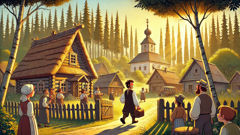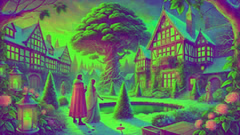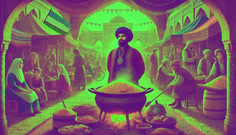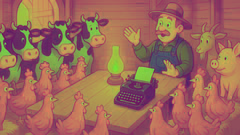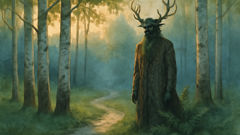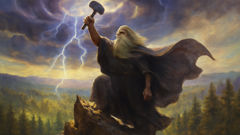Introduction
In the rolling countryside of old Russia, where pine forests cast cool shadows over sun-warmed fields and the air is sweet with the scent of rye and wildflowers, there once stood a crooked little village with sagging roofs and timeworn fences. The people here were hardy and cheerful, their days marked by the rhythms of toil and laughter, their evenings filled with tales spun by firelight. Yet, at the heart of this village, between the crumbling chapel and the winding lane, lived a man whose greed was as bottomless as the village well. This was the priest: rotund, quick-eyed, and endlessly scheming, his black cassock flapping behind him like a crow’s wing as he strode about counting every copper and crumb. He fancied himself a master of bargains, forever dreaming up clever ways to fatten his purse at the expense of his trusting flock.
One summer, as the fields ripened under a sky ablaze with sunlight, the priest found himself in need of a good workman. His storeroom sagged with grain, his fences were falling, and his kitchen chimney coughed more smoke than flame. Yet he could not bear to part with his silver for honest labor. So, he set his mind to finding a fool—someone sturdy enough to toil but simple enough to work for nothing. Fate, however, has a way of sending not fools, but foxes in peasant’s clothing.
Balda was such a man. Tall as a young birch, broad in the shoulders, with hair the color of ripe wheat and eyes bright with mischief, he wandered into the village looking for work. His clothes were plain, his boots worn, but there was a steady, easy confidence about him that set him apart from other travelers. Balda had seen hardship, yet he bore it lightly, with a ready laugh and a talent for turning trouble into opportunity. When he appeared at the priest’s gate, carrying nothing but a knapsack and an easy grin, the priest’s greedy heart leapt for joy. Here was his fool—or so he thought.
Thus began the tale that would echo in the village for generations: the story of how a clever workman matched wits with a miserly priest, and how, in the end, justice—delivered with a flick of the finger—proved sharper than any priestly scheme.
A Bargain Struck in Greed
The village priest stood on his porch that morning, surveying the world as if all the cocks crowed at his command. He’d sent his wife to mend the chicken coop and his son to fetch water, leaving him alone to ponder how best to keep his house in order without opening his purse. He was still grumbling over the cost of repairs when Balda strolled up the path, boots caked in dust, a lopsided smile brightening his sun-tanned face.
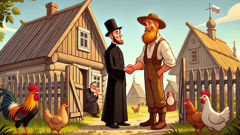
“Good day to you, Father,” Balda called, doffing his cap. “I hear you need a hand.”
The priest narrowed his eyes, calculating. Balda’s arms were thick as fence rails, his back straight as a plow’s furrow—just the sort of man who could set right all the things the priest had been too stingy to fix. But how to get this work done for nothing? The priest’s mind ticked like a clock. “Workman, I do need help,” he said, faking a mournful sigh. “But my house is poor. I cannot pay with coin. Perhaps you’ll work for food and shelter?”
Balda, who knew the worth of an honest day’s labor, shrugged. “I eat little and sleep where I may. But what else do you offer?”
The priest, realizing he’d been too stingy even for his own liking, tried a new tack. “If you serve me for a whole year, I’ll pay you with—let’s see—a handful of barley, a crust of bread, and three flicks to your own forehead.”
Balda laughed, a rich sound that made even the chickens pause. “Three flicks to my own forehead? That’s no bargain, Father. But what if, when the year is done, I flick your forehead instead?”
The priest, imagining his own cleverness, agreed at once. “Done! A year’s work for a few scraps and three harmless flicks. You’re a fool, workman, but I’ll take your bargain.”
And so it was settled: Balda would labor for the priest, and at the end of his term, the priest would receive three flicks to the forehead—an arrangement the priest found so amusing he nearly choked on his own laughter. He didn’t believe for a second that such a thing could come to pass. Balda nodded, and with a smile that held a secret, he set to work.
From that day forward, Balda was everywhere: mending fences with swift hands, chopping wood with sure strokes, scrubbing the priest’s grimy kitchen till it gleamed, and even bringing in firewood before dawn. The villagers soon took notice. “That Balda,” they whispered, “he’s worth ten men!” The priest’s wife, long used to doing two people’s work, felt as if she’d stumbled into a fairy story. The priest himself grew plumper and lazier, congratulating himself on his bargain every time he counted his unspent coins.
But Balda was no fool. He worked cheerfully, never complaining, and every evening as the priest retired to count his savings, Balda would sit by the fire, whittling a bit of wood or humming a tune. Sometimes, his eyes twinkled with quiet amusement when the priest muttered about the coming end of the year and the supposed price of three flicks. The villagers began to look at Balda with a mixture of admiration and curiosity. Why did he agree to such a strange deal? Was he simple—or was there something more beneath that easy smile?
Seasons turned. The fields grew golden and then lay bare beneath snow. The priest’s house was snug and solid, his storehouses full, and all thanks to Balda’s tireless work. Yet as the year waned, the priest’s mood soured. He began to worry that perhaps Balda was cleverer than he looked, and those three flicks might not be as harmless as he’d first thought. One night, as frost crept across the windows, the priest’s dreams were haunted by visions of Balda’s strong fingers and the sharp crack of a flick to the forehead.
Desperate to escape his own bargain, the priest hatched a plan. He decided to send Balda on an impossible errand, hoping the workman would either fail or never return. Calling Balda to his study, the priest leaned close and whispered, “There’s one last job, my good fellow. Down by the sea, the sea devils have been stealing from my grain stores. Go there and drive them away. Return only when you’ve made them pay what they owe.”
Balda just nodded, hiding a smile. “As you wish, Father.”
With that, Balda set off toward the edge of the world, where the cold sea crashed against black rocks and legends whispered of devils who danced in the spray. The villagers watched him go with wide eyes and whispered prayers, while the priest congratulated himself on his cunning once again, certain that this errand would rid him of Balda forever.
The Cunning of Balda and the Sea Devils’ Dilemma
Balda’s journey took him through pine groves where the shadows stretched long and cool, across meadows silvered with morning dew, until at last he reached the wind-lashed coast. The sea was a rolling mass of green and gray, foam-capped waves pounding at boulders like a drum. Here, legends said, lived the sea devils—wily creatures half-fish, half-shadow, who played tricks on mortals and stole what they pleased from landfolk.

Balda crouched on a rock, watching the surf. Before long, a little devil popped its head from the water—a comical creature with webbed ears and a nose like a pickled cucumber. “Ho there!” Balda called. “Your clan has been pilfering from the priest’s stores. Pay up, or I’ll thrash you with my fists.”
The sea devil blinked in surprise. “It’s not our fault!” it squeaked. “The priest is greedy—he’s cheated us for years!” But Balda only grinned. “Pay your debts, or answer to me.”
Desperate, the devil begged Balda to wait while he consulted his kin. Soon, a whole council of sea devils gathered on the rocks, their eyes wide with worry. They offered Balda a challenge: if he could outwit them in a contest of strength and cleverness, they’d pay their debt. If not, he’d return empty-handed.
Balda agreed. First came a test of speed: who could run fastest across the beach? The devils sent their fleetest runner, but Balda—thinking quickly—tossed a hare into the dunes and claimed it as his “little brother.” The devil chased hopelessly, never catching up.
Next came a test of strength: who could carry the heaviest load? The devils tried to haul a boulder up the shore, puffing and groaning. Balda tied a rope around the church bell and hoisted it with ease, his muscles flexing like coiled ropes.
Finally, they challenged him to squeeze oil from a stone. The devils snickered, thinking it impossible. But Balda, ever clever, palmed a piece of cheese in his hand and squeezed it until oil dripped out. The sea devils gaped in astonishment, admitting defeat.
With grumbling and sulking, they paid what they owed: sacks of grain, a silver fish-scale cloak for the priest’s wife, and even a golden shell for Balda himself. He thanked them with a wink and set off home, whistling a tune. Along the way, villagers flocked to meet him, marveling at the treasures he carried.
But the priest was not pleased. He’d hoped never to see Balda again. Now, with the end of the year upon him and Balda’s pockets full of proof, there was no escape from the contract he’d signed in arrogance. Still, the priest had one last scheme. He invited Balda to dinner, hoping to soften him with feasts and flattery, then offered him new bargains—anything to avoid those three fateful flicks.
Balda listened politely but refused every offer. “A deal is a deal, Father,” he said. “And three flicks it shall be.”
The priest grew pale as milk. He locked himself in his study, poring over old books for a loophole. He begged his wife to talk sense into Balda, but she only laughed, finding the whole affair richly deserved. As the sun set on the final day of Balda’s year of labor, the village gathered outside the chapel, eager to witness the outcome of the strangest bargain ever struck.
The air was thick with anticipation as Balda stood before the priest, who trembled like a leaf in a storm. The workman’s eyes sparkled with mischief, but his hand was steady. “Ready, Father?” he asked gently. “You agreed to three flicks—no more, no less.”
Justice Delivered: The Flicks and the Legacy of Balda
The village square bustled with anticipation. People gathered in clusters, some pressing forward for a better view, others whispering behind their hands. Chickens scattered as children darted between legs, eager for spectacle. Even the oldest babushkas, swaddled in their thickest shawls, took up seats on overturned barrels to see what would become of the priest and his workman.
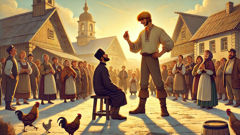
Balda stood tall in the middle of the square, his sleeves rolled up to reveal arms tanned and strong from a year of honest toil. Beside him, the priest quivered, his round face ashen, eyes darting between the villagers and Balda’s calloused hands. Every trick, every scheme had come to naught. Now only the terms of his own bargain remained.
The priest tried once more to wriggle free. “Perhaps just one flick, good Balda? Or a gentle tap?”
Balda only smiled and shook his head. “A contract’s a contract, Father.”
With all assembled watching—wives with aprons dusted in flour, men in patched coats, boys perched on fences—Balda held up his hand. “The first flick,” he announced, and with a quick motion tapped the priest’s forehead. It was not cruel, but sharp—a reminder of all the little cruelties the priest had meted out through stinginess and pride. The priest winced, but the crowd laughed, seeing justice done.
The second flick was firmer. It rang out across the square like a knuckle on wood. The priest staggered back, holding his head. Yet there was no malice in Balda’s eyes—only the certainty of a man keeping his word. The villagers cheered, some clapping Balda on the back.
The third flick was the gentlest of all, though it made the priest’s eyes water and his knees buckle. It was not pain that brought him low, but shame—a sudden awareness of how his own greed had led him here. The crowd fell silent, watching as the priest sat in the dust, his pride crumbled at last.
Balda helped him up, steadying the priest with a strong arm. “Let this be a lesson,” he said softly. “A bargain made in greed brings only sorrow. But hard work and honesty bring rewards greater than gold.”
The villagers murmured their agreement, nodding to each other as they gathered their children and returned to their chores. The story of the priest’s comeuppance spread through the countryside like fire on dry grass. Soon, no one came to the priest with foolish bargains, and he learned at last to treat his flock with fairness.
Balda did not linger. He left the village as he had come—light-footed and smiling, his knapsack a little fuller and his heart lighter still. Some said he traveled on to new towns, always ready with a helping hand and a clever word; others whispered that he’d gone to work for the tsar himself. Wherever he went, tales of Balda followed, reminding rich and poor alike that wit and kindness are worth more than all the coins in Russia.
And so it was that the crooked little village, once ruled by greed, became a place where laughter and justice walked hand in hand. To this day, if you wander through those pine-shadowed lanes, you might hear an old woman telling children the story of the priest and his workman Balda—a tale as bright and bracing as a summer wind.
Conclusion
In the end, Balda’s name became a byword for cleverness throughout the region, and his story a lesson passed from parent to child beside winter hearths. The village flourished in the years that followed, its people working together with newfound respect for fairness and honesty. The priest, once blinded by greed, learned to open his heart—and his larder—to those in need, lest he find himself again at the mercy of a workman’s flick. And while Balda himself moved on, his spirit lingered in every laughter-filled field and bustling market day. His tale is a reminder that cunning used for good can topple even the craftiest of schemes, and that justice need not be cruel—it can come with a wink and a smile, sharp enough to sting but gentle enough to heal. So if ever you are tempted to strike an unfair bargain, remember Balda: strong of arm, quick of wit, and always ready to teach a lesson that lasts far longer than gold.

